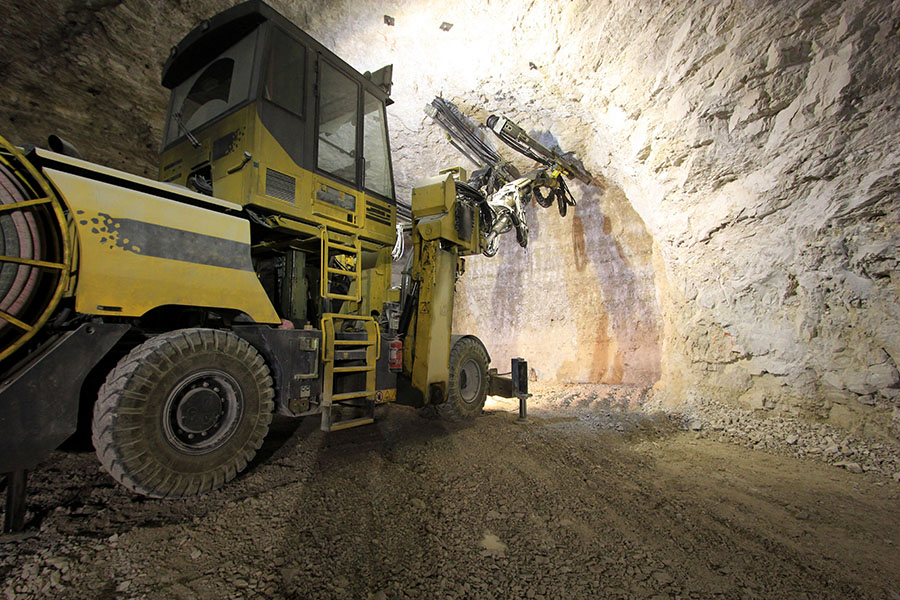Maurice Jackson: Joining us for a conversation is Ryan King, the vice president of corporate development and investor relations for Calibre Mining Corp. (CXB:TSX.V; CXBMF:OTC.MKTS).
Delighted to have you back to provide us with a number of updates regarding the value proposition of Calibre Mining, which is focused on execution, opportunity and discovery. Before we begin, Mr. King, please introduce Calibre Mining and the opportunity the company presents to the market.
Ryan King: Calibre Mining is a multi-asset gold producer focused on execution and building sustainable value for our shareholders, communities we operate in, and all stakeholders. This past year Calibre has gone through a very significant transaction with B2Gold Corp. (BTG:NYSE; BTO:TSX; B2G:NSX). Prior to this transaction we were, and still are, an exploration company, but we were predominantly an exploration company focused on some assets in Nicaragua called the Borosi Triangle, or Golden Triangle, up in the northeast section of Nicaragua. We went through a transaction where we acquired two producing gold mines and one development-stage project in Nicaragua with B2Gold. We raised a little over $100 million dollars to complete that transaction. Our team is the ex-Newmarket gold team, which successfully discovered very high-grade gold mineralization at the Fosterville Mine in Australia, and then went on to merge Newmarket Gold with Kirkland Lake Gold Inc. (KL:TSX; KL:NYSE).
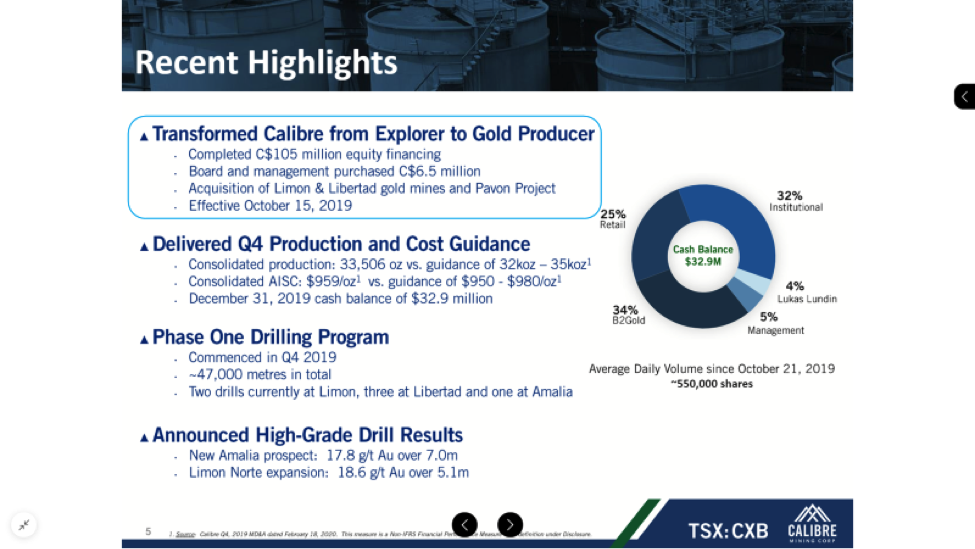
We see another excellent geological opportunity here in Nicaragua. Our focus is, as you said, on execution, opportunity, and discovery. Calibre believes that we've got the right ingredients to execute our value proposition successfully in Nicaragua. We're very excited to be a gold producer and doing a lot of exploration work around those assets.
Maurice Jackson: We last spoke in December of 2018. Calibre Mining has exceeded all of those benchmarks for success from that interview. We're going to delve into those shortly. But before we get into that, let's discuss the press release that has shareholders giving a standing ovation to management. That is the strategic alliance with Calibre Mining and Rio Tinto Plc (RIO:NYSE; RIO:ASX; RIO:LSE; RTPPF:OTCPK), entering into a $45 million earning agreement (press release). Sir, please provide us with the details of this transaction.
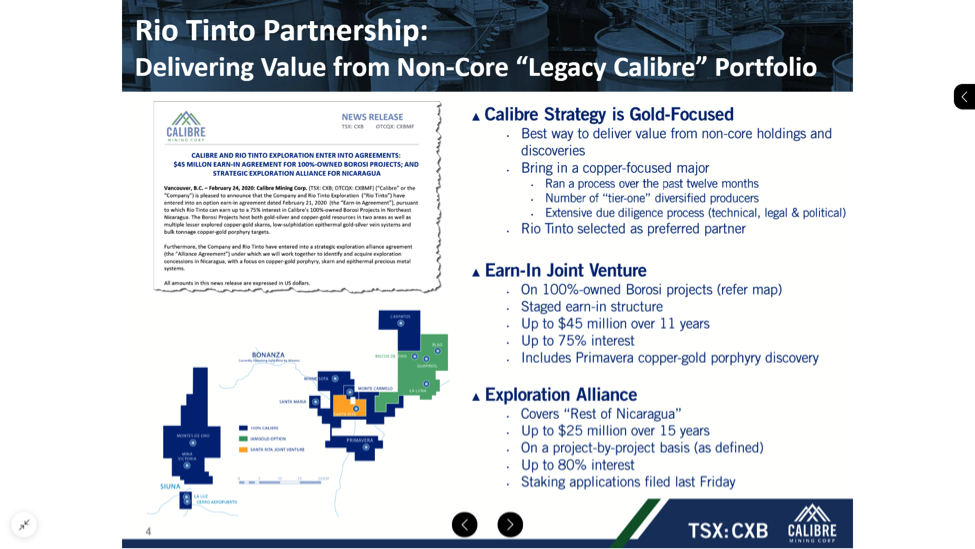
Ryan King: Prior to announcing this deal with Rio Tinto, they had not been in the country before. This is what required an NCE, a new country entry, for Rio Tinto. This spawned back to 2018 actually, when we first started to have discussions with them about the geological potential at some of the assets that we have in those Borosi exploration projects up in the northeast corner, which were the initial assets that brought us to Nicaragua.
It was way back in 2013 when we discovered a copper gold porphyry system. At the time it didn't get big enough to be a deposit or a mine, but we continued to do work on it. We continued to advance it. We weren't able to do drilling. We did geochemical work. We did some geophysical work and identified a number of additional targets. What happened was that when we started to introduce the opportunity to Rio Tinto, they brought some people down to look at it and felt that it was a good geological opportunity. Keep mind, Rio Tinto only seeks to be aligned with significant size deposits.
In the northeast portion, or the northern half of the country of Nicaragua, it has the type of rocks—the age of rocks, older rocks—that could have these large, porphyry type deposits. After 18 months of due diligence, not only technically but on the infrastructure in the country, political situation in the country, the geological potential in the country, Rio Tinto was given the green light to be able to proceed and go into the country and be able to do an earn-in deal with us and along with a strategic alliance with us. This is very exciting that the second largest mining company in the world has validated Nicaragua as a country that they'd like to enter into and do business in.
The deal is that on our 100%-owned Borosi concessions, which amass to about 665 square kilometers, Rio Tinto can earn up to 70% in those concessions. . .sorry, 75% of those concessions by spending US$45 million. It's an incredible deal for our shareholders. Because keep in mind, we acquired the producing assets down in the south part of Nicaragua, La Libertad and El Limon. Our team is focused on extending mine life and drilling all around those operations. The Borosi concessions up in the north weren't going to see a huge amount of investment this year by Calibre. This allows some additional optionality for our shareholders and new shareholders. If Rio and Calibre decide to really spend some money there and do some drilling, I don't know what the plans are going to be yet. Technical sessions are underway with both companies to decide on a plan.
That's just additional optionality for our shareholders. It's very exciting that they've identified this opportunity. But in addition to that, we signed this strategic alliance with Rio [for mineral concessions on a] total amount is 1.4 or 1.5 million hectares of the northern portion of Nicaragua. I think it's close to 15% of the land mass of Nicaragua. They're very excited. We're very excited about this. Then, during this strategic alliance, Rio Tinto would be funding and doing generative-type work. If a project is identified in the next couple of years, they could pluck that project out of the strategic alliance and enter into another earn-in joint venture for up to $25 million and get 80% of that project.
There's a lot of opportunity here, a lot of optionality in the portfolio, that we, as Calibre, would not have maybe focused on so much in the near term because we're so focused on the operating assets that we have down in the southern Nicaragua. It's a very exciting opportunity for us. I think as I mentioned, it really does validate the geological potential and it validates the country as a great place to operate.
Maurice Jackson: Truly impressive, sir. Ryan, this reminds me of our conversation back in December. You were foot stomping about the commercial and the technical expertise that the management team has. This is a great example here. But the business acumen and the geological acumen—it goes further than this transaction. Let's look back now at 2019 and discuss some additional impressive feats that Calibre Mining accomplished in the last 15 months.
Mr. King, back in July of 2019, Calibre made an accretive move joining forces would B2Gold (press release). You acquired two producing mines from El Limon and the La Libertad. Introduce us to these mines, and why is this the right move for shareholders?
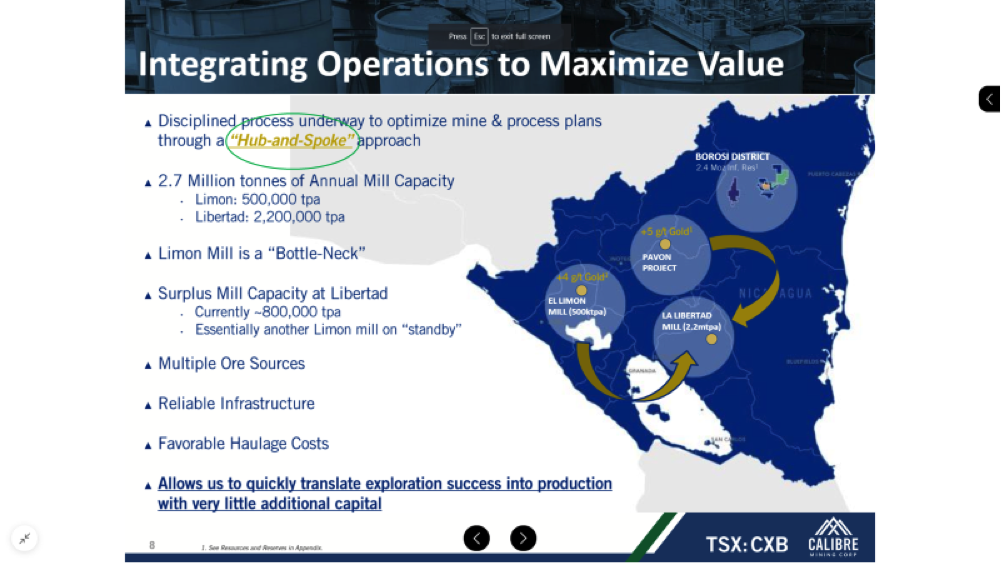
Ryan King: In our first interview, when we first discussed Calibre as mentioned, we were just an exploration company with resources in the ground and partners in the country. IAMGOLD is one of our partners. Now Rio Tinto is one of our partners up in the north. As the market was back and forth with exploration companies, our team that had bought producing gold mines in a previous life—in Newmarket Gold and through cash flow, through operating cash flow, [where] we were able to fund exploration, expand mine life and make new discoveries—we felt that that was going to be the best move for Calibre shareholders—building another operating, cash-flowing business.

In doing so through relationships, our founders, Doug Forester, Doug Hurst, Blaine Johnson and Russell Ball, felt that the best move would be to buy, if we could, operating assets. We were able to strike a deal, a win-win deal, with B2Gold in the sense that B2Gold were focused so heavily on their Otjikoto mine, their Masbate mine and Fekola, that we were able to bring in the right team with the experience in-country. We were able to raise enough capital that we could really invest in these operations. Yet, at the same time B2 retains almost 34% equity ownership in Calibre. As you mentioned, we have joined forces with B2 on this. We think this is a fantastic opportunity for Calibre shareholders and that this year, in 2020, we will produce between 140,000 and 150,000 ounces of gold and right around $1,000 all-in-sustaining cost (AISC). It's a great opportunity for our shareholders.
What's equally, or even more exciting, for Calibre shareholders is the amount of drilling we plan on doing in 2020. We've earmarked almost 50,000 meters for drilling. That has been going very well. We started that in the fourth quarter of 2019. That's been going very well. We've already had success with a new area at the La Libertad mine called Amalia in a very large concession that had never been drilled. Also at the El Limon mine, we were drilling down-plunge of current resources. And it looks like we'll expand resources at the El Limon central and Norte deposit.
Really exciting time for Caliber. Really exciting time, I think, for the operations, as we're seeing lots of new investment. We've been really welcomed into the country. We've met the minister of Mines and Energy. We've met the president. They're very encouraged about the new investment that we're making into these operations. Also, they really wanted to know that B2 was still involved. We have a board member at Calibre that's from B2Gold. We have an advisory group that's partly made up of B2Gold employees and executives. . .with their significant 34% equity ownership of the company, they are very, very much involved with us in these assets.
It's exciting for all people involved. I think it's a really good opportunity for all looking at the gold space. Now we're at $1,650 gold. When we announced this deal, we were back at $1,300 gold. It's been nice to be a part of a rising gold market environment for Calibre.
Maurice Jackson: Mr. King, let's go back on site real quick. I want to ask you one more question before we leave there. Should expansion become successful, can the current mills meet production demand?
Ryan King: It's a great question because one of the things that we actually did during the fourth quarter when we took over the assets was at the La Libertad operation, we idled down one of the ball mills. We felt that by doing so we could extend mine life, but also our focus is really on margin. Instead of really cranking up production, let's focus on margin. By idling down one of these ball mills, we're almost saving $500,000 dollars a month currently of power, reagents and liners in the mill.
The focus turned to margin so that we can accretively reinvest in the operations. One of the opportunities is all of the new targets we've identified that level at La Libertad. If we do have success, we could potentially, at the right time, turn that second ball mill back on at La Libertad, which would give us a total of 2.2 million tons of throughput capacity, and could therefore be the right size for the operation. We have excess capacity at La Libertad, which is a great place to be. All the capital has been sunk in the mill. It's just about finding new opportunities, new mineralization deposits that could be put through the mill.
And, where the bigger opportunity lies is we’ve started to do some work in the country now. Because of the reliable infrastructure and the favorable cost structure to haul ore around the country, we can see that rather than just looking at the two mills as two standalone mills, which they are, we really look at them as integrated units now. At Libertad, the total capacity is 2.2 million tons of installed milling capacity. We're only using 1.5 or 1.6 million tons. At El Limon, we've got 500,000 tons of installed capacity. What we're really looking at now is multiple different ore sources, and then where's the best place to haul the order around. Because we can haul around the country roughly about 200 and 250 kilometers between the two mills.
Based on the analysis we've done, it would cost us about a half a gram to three quarters of a gram to haul from, say, Limon to La Libertad or from Pavon, for example, a development-stage project that we're working through, and permitting would be about a half a gram to three quarters of a gram at today's gold prices. Quite accretive to look at this as what we call a hub-and-spoke approach.
A long-winded answer to your question is, yeah, it looks like we do have the capacity, barring a great new discovery or some resource expansion that we could really utilize the installed capacity in the country. Down the road, depending on the size of a new discovery, we could see potentially looking at a mill expansion, but we do have excess capacity and capital has been sunk. It's pretty exciting for us there to hopefully be able to take advantage of the excess capacity in-country.
Maurice Jackson: All right. Let's just summarize here for reader. We have Rio Tinto with a $45 million earn-in agreement. B2Gold: we have the acquisition of two producing mines. But wait a minute, there's more. Let's revisit September (press release). You did an impressive 102 million equity financing to advance some existing projects in the portfolio and you're embarking on an ambitious 40,000-meter diamond core drill program. Please share on which projects there will be drilling, and can you share with us about the genetic model on the target zones?
Ryan King: You're absolutely right. We acquired the two mines and then we very quickly identified a number of resource expansion and discovery drilling opportunities around those operations. Part of the reason we raised a little bit excess of what was required to do the deal with B2 was so that we could reinvest in the operations, so that we could see a real significant bump up of drilling and optimization at the operations. These are what's known as low sulfidation epithermal vein systems—between 5 and 20 meters of width, generally coming right to surface based on what we've seen, and anywhere from 2 to upwards of 20 grams per ton, [which] we've seen in some of the drill results over the years historically and even some new ones.

For example, we started drilling at the high-grade El Limon Central and Norte vein structure that is two and a half kilometers long. We only drilled four holes in the fourth quarter of 2019, but three out of the four holes actually intersected very good widths and grade—for example, almost 12 grams per ton gold over 5 meters. This is just below inferred resources. It looks like resources will be expanding. We drilled 18.7 grams per ton gold over 5 meters. Then 4.2 grams over 20 meters. This was down-plunge of current resources at this new high-grade open pit that we're currently operating at the El Limon mine. It looks like a really good opportunity to expand resources. We're drilling again down plunge of the known zones there as well.
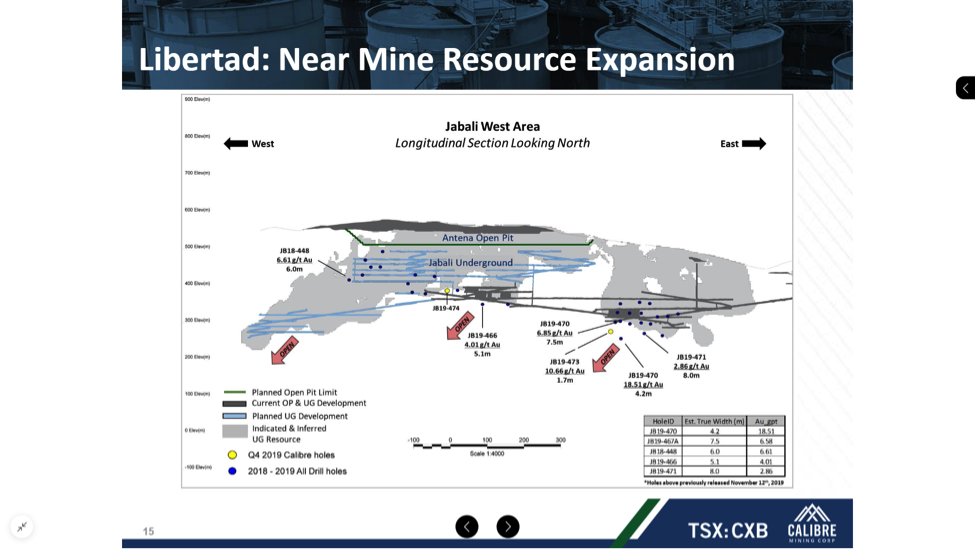
Over at the La Libertad operation, over 1.7 million ounces of gold has been produced in and around the La Libertad proper concession, which is roughly 200 square kilometers. We've got three drills turning on a number of targets there, some of which have smaller resources that look like they have expansion potential, and some are in new areas that have great geochemistry anomalies that not been drilled.

Then [there is] a new area which we call Amalia. Amalia had been identified by B2Gold. Some great trench results; 6.7 meters of 7 grams, 13 meters of 4.7 grams, so about a kilometer-long geochemistry signature. We went in, and in the fourth quarter of 2019 drilled some holes, and we got some excellent results and it looks like we've identified a new area. One of the drill intercepts with 17.8 grams over 7 meters, only 45 meters vertical from surface.
Keep in mind, this had never been drilled before. There's been no mining there. We're in an area that's 350 square kilometers in that mineral concession. Very exciting opportunity to maybe we've come into a new district or camp of these low-sulfidation veins, like the La Libertad proper. Amalia is only located 30 kilometers north of the current mill, which has as mentioned excess capacity. It's a pretty exciting opportunity for us. We have a total of four drills operating at La Libertad right now. Stay tuned for future news releases and drill results.
Maurice Jackson: The value proposition for Calibre Mining just seems to continue to get better and better. Multimillion dollar question: When can the market expect to see drill results?
Ryan King: Everyone likes to get to see the drill results as they unfold. Most companies would put out drill results once, maybe twice a year for an operating company that has between 100,000 and 200,000 ounces of annual production. Because of the amount of drilling is so significant this year for Calibre, we will be putting out results every 6–7 weeks. I expect our next set of drill results will come from the El Limon gold mine, where we're going to be producing 70,000 to 75,000 ounces this year. El Limon have a number of different zones. [There's the] Limon Central Norte, 2.5-kilometer, open pit vein structure, which we're drilling now, as well as an underground mine called Santa Pancha and Panteon, which we're drilling as well. I suspect the next set of results will come from Santa Pancha and Panteon. That'll probably be in the next 2-3 weeks.
Then in April, we should have some results from La Libertad, the Amalia district, as well as a couple of zones in around the La Libertad district. Lots on the go, as I've mentioned. We're almost doing 50,000 meters in what we're now calling a phase-one drill program. This could be a multiphase drill program, obviously predicated on success, but it's a very exciting time for Calibre and all the news that that will be coming out.
Maurice Jackson: Switching gears, Ryan, what is the next unanswered question for Calibre Mining? When can we expect an answer and what will determine success?
Ryan King: A lot of people have been asking us about mergers and acquisitions, [given] the bench strength that we have in this team. Our chief executive officer [had] over 25 years at Newmont as the chief financial officer there. The founders of Calibre, the founders of Newmarket Gold, which sold for over a billion dollars to Kirkland Lake in a very successful transaction that saw Kirkland Lake go up five- or sixfold from that transaction, or even more. A lot of people [are] asking us about mergers and acquisition in a rising gold market environment. I would say that we're always looking. We're always looking at opportunities where we can add value for our shareholders. Where we can add accretive value, not just to get bigger, but accretive value so that we can work towards a higher share price.
But what we see in front of us right now is a really good opportunity to execute on these assets, drill a number of these targets, because the geological potential looks so good. Then look to extend mine life, make new discoveries, expand resources. That's going to add a lot of value in our opinion for our shareholders and to this new story, this new budding story of Calibre. It's only six months old now. I think that's the big question we consistently get.
But the news going forward will be a lot of drill results, quarterly results, financial results. As the year unfolds at these gold prices, we should be adding cash to our balance sheet, reinvesting in the assets. We'll hear some as the year goes on, we're advancing this Pavan gold project, which could be another ore source for the La Libertad mill.
There's a number of things coming out as well in the background. We'll consistently and continuously look at mergers and acquisitions that could potentially add value. But first and foremost, it's execution. It's drilling and building mine life at these operations to be able to see the most amount of value that we can for these assets in the short period of time. A lot's going on across the board, Maurice.
Maurice Jackson: Speaking of the shareholders, can you please provide us with an update on the capital structure of Calibre Mining?
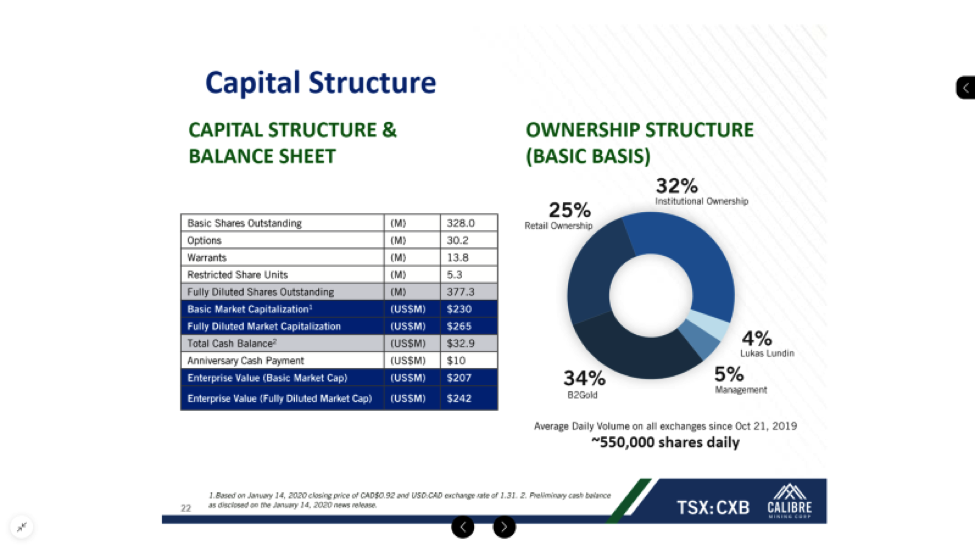
Ryan King: I think today, at about CA$0.80, our market capitalization is around CA$240–250 million. We essentially have no debt. We've got one remaining payment of $10 million to B2Gold, which is in October of 2020. We trade on average between 500,000 to 750,000 shares a day. We have just a little over or just a little under US$33 million in the bank. Lots of capital to reinvest in these operations.
As mentioned, our guidance for the year is 140,000 to 150,000 ounces at roughly $1,000 all-in sustaining cost, plus, some investment we're putting in the operations. I think it's between $20 and $25 million and about $15 million in drilling for the almost 50,000 meters of drilling that we'll do in this phase one program.
About CA$240 million? What is that about? Just a little under US$200 million market cap for a company of our size I think demonstrates a good value proposition. The management insiders own just a little under 6%. A well-known resource investor, Lukas Lundin, owns a little under 5%. We've got about 35% institutionally held. B2Gold, of course, owns the 34% ownership in Calibre. That sort of breaks down the capital structure of the company, and the balance sheet in a sense.
Maurice Jackson: In closing, sir, what keeps you up at night that we don't know about?
Ryan King: [For] any resource company that is developing operations, first and foremost, the most important thing is your social license around the operations in any place where you operate. We have a very good social license around the mines. We have good relationships with our communities. We do a lot of excellent environmental, social community work. We have a great team in Managua that does all of that.
What keeps me up at night is really, with these types of operations, with any type of mining operation, you always have to find more to be able to put through a mill and keep the operation running. That would be one thing that I think for any mining company is you're always trying to reinvest. You're always trying to find more resources, whatever it is, whatever commodity you're mining. In our case it's gold, is finding more gold to be able to extend the mine life, to be able to keep all people employed and add a lot more value.
With the 50,000 meters of drilling that we're doing, we're doing it because we think there's a great opportunity to make new discoveries and expand resources and then, of course, extend mine life.
What keeps me up at night is maybe you don't find gold. You never know. Sometimes deposits kink when they should have bent. Geology is a difficult thing, but we have a very good team. Our VP exploration Mark Petersen has been doing this for well over 30 years. He's an experienced geologist. He's found a lot of gold in his career. We've got a good geological team. But I think that's something that stays in the back of any miners mind is being able to expand resources. That's the only thing I think that would keep me up at night.
But other than that, obviously we are concerned with the price of gold. You never know what the price of gold is going to do. But that's an uncertainty. I think those are the only two things, Maurice, that would keep me up at night.
But the one thing I will say is, and that it's helping me sleep better, is the fact that in our in our Q4 drilling, we have found new zones like this Amalia. We have actually intercepted in three of the four holes that we drilled at La Limon Norte it looks like expanded resources. We're already having success. That's helping me sleep better now.
Maurice Jackson: Sir, last question. What did I forget to ask?
Ryan King: You asked all the right questions. The only thing is I'm surprised you didn't ask was where do you see the price of gold going? Because everyone asks that question and everyone wants a different answer or hopefully the same answer. It's going up, right? Of course, it's going up.
Maurice, you ask good questions, intelligent questions about the operations, about the value proposition for Calibre. I think we've touched on most of those. The underlying thing is a rising commodity environment—so, for example, right now gold has been rising over the last number of months and years, particularly with the uncertainty with the debt levels, with the macro economic environment, with the fears of a potential recession, etc. Also, with the fears now that the different federal reserves, the different banks around the globe really are not able to come up with new creative ways to provide quantitative easing. We've just recently seen the rate cuts by the Canadian Bank, as well as the Federal Reserve in the United States. These were emergency cuts.
To me, we're in the right space. To me, we're in an exciting area with lots of drilling. We're in the right commodity right now. Gold definitely has the potential to go a lot higher. I read a gentleman by the name of David Rosenberg. . .he's really data-driven. He doesn't get too bogged down in different headlines and media, etc., but really pays attention to the data. He says he could really see gold going to $3,000 an ounce in this environment that we're in.
I don't know where it goes. We do the best we can focus on our costs versus what we're selling for obviously. But that would be an exciting time for people invested in the gold space if that does happen. I'm excited to see where it goes and what happens in the future.
Maurice Jackson: Mr. King, for someone listening that wants to get more information on Calibre Mining, please share the contact details.
Ryan King: www.calibremining.com.
Maurice Jackson: As a reminder, Calibre Mining trades on the TSX, symbol CXB; on the OTCQX, symbol CXBMF. Calibre Mining is a sponsor of Proven and Probable. We are proud shareholders for the virtues conveyed in today's message. Before you make your next bullion purchase, make sure you call me. I'm a licensed representative for Miles Franklin Precious Metals Investments where we provide a number of options to expand your precious metals portfolio. From physical delivery, offshore depositories, precious metal IRAs and private blockchain-distributed ledger technology, call me directly at (855) 505-1900 or you may e-mail maurice@milesfranklin.com.
Finally, we invite you to subscribe to www.provenandprobable.com, where we provide mining insights in bullion sales. Ryan King of Calibre Mining, thank you for joining us today on Proven and Probable.
Maurice Jackson is the founder of Proven and Probable, a site that aims to enrich its subscribers through education in precious metals and junior mining companies that will enrich the world.
[NLINSERT]Disclosure:
1) Maurice Jackson: I, or members of my immediate household or family, own shares of the following companies mentioned in this article: Calibre Mining. I personally am, or members of my immediate household or family are, paid by the following companies mentioned in this article: None. My company has a financial relationship with the following companies mentioned in this article: Calibre Mining is a sponsor of Proven and Probable. Proven and Probable disclosures are listed below.
2) The following companies mentioned in this article are billboard sponsors of Streetwise Reports: None. Click here for important disclosures about sponsor fees.
3) Statements and opinions expressed are the opinions of the author and not of Streetwise Reports or its officers. The author is wholly responsible for the validity of the statements. The author was not paid by Streetwise Reports for this article. Streetwise Reports was not paid by the author to publish or syndicate this article. The information provided above is for informational purposes only and is not a recommendation to buy or sell any security. Streetwise Reports requires contributing authors to disclose any shareholdings in, or economic relationships with, companies that they write about. Streetwise Reports relies upon the authors to accurately provide this information and Streetwise Reports has no means of verifying its accuracy.
4) This article does not constitute investment advice. Each reader is encouraged to consult with his or her individual financial professional and any action a reader takes as a result of information presented here is his or her own responsibility. By opening this page, each reader accepts and agrees to Streetwise Reports' terms of use and full legal disclaimer. This article is not a solicitation for investment. Streetwise Reports does not render general or specific investment advice and the information on Streetwise Reports should not be considered a recommendation to buy or sell any security. Streetwise Reports does not endorse or recommend the business, products, services or securities of any company mentioned on Streetwise Reports.
5) From time to time, Streetwise Reports LLC and its directors, officers, employees or members of their families, as well as persons interviewed for articles and interviews on the site, may have a long or short position in securities mentioned. Directors, officers, employees or members of their immediate families are prohibited from making purchases and/or sales of those securities in the open market or otherwise from the time of the interview or the decision to write an article until three business days after the publication of the interview or article. The foregoing prohibition does not apply to articles that in substance only restate previously published company releases.
Proven and Probable LLC receives financial compensation from its sponsors. The compensation is used is to fund both sponsor-specific activities and general report activities, website, and general and administrative costs. Sponsor-specific activities may include aggregating content and publishing that content on the Proven and Probable website, creating and maintaining company landing pages, interviewing key management, posting a banner/billboard, and/or issuing press releases. The fees also cover the costs for Proven and Probable to publish sector-specific information on our site, and also to create content by interviewing experts in the sector. Monthly sponsorship fees range from $1,000 to $4,000 per month. Proven and Probable LLC does accept stock for payment of sponsorship fees. Sponsor pages may be considered advertising for the purposes of 18 U.S.C. 1734.
The Information presented in Proven and Probable is provided for educational and informational purposes only, without any express or implied warranty of any kind, including warranties of accuracy, completeness, or fitness for any particular purpose. The Information contained in or provided from or through this forum is not intended to be and does not constitute financial advice, investment advice, trading advice or any other advice. The Information on this forum and provided from or through this forum is general in nature and is not specific to you the User or anyone else. You should not make any decision, financial, investments, trading or otherwise, based on any of the information presented on this forum without undertaking independent due diligence and consultation with a professional broker or competent financial advisor. You understand that you are using any and all Information available on or through this forum at your own risk.
Images provided by the author.



